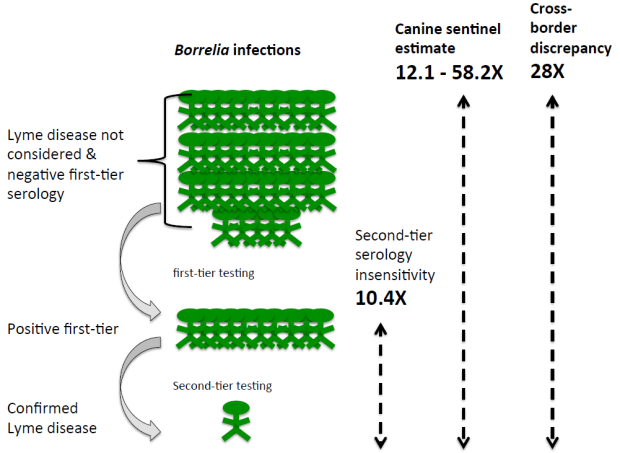Lyme disease vastly under-detected in Canada, according to new study
A new study published in the journal Healthcare suggests the vast majority of Canadians who have Lyme disease are slipping through the cracks.
The research was done by Vett Lloyd, a Mount Allison University biology professor, and Dr. Ralph Hawkins, a clinical associate professor at the University of Calgary's Cumming School of Medicine.
Lloyd is a founding member of Mount Allison's Lyme Research Network, and Hawkins is a member of the Libin Cardiovascular Institute of Alberta.
Lloyd said they started with a question brought to the research community by patients and their advocates.
They wanted to know why the official number of Lyme diagnoses was so low — fewer than 1,000 — when many thousands of people belong to the patient community.
"If everyone is working from the same baseline information we can perhaps start to move forward to dealing with this disease," said Lloyd, who contracted Lyme disease from a tick in her backyard, and has been studying ticks for several years.
Three data sets

Lloyd and Hawkins used New Brunswick as a case study and looked at three sets of data.
One was the number of cases near the Canada-United States border.
"The biology is the same," said Lloyd. "The ticks are the same. The climate is the same. The vegetation is the same. The animals are the same. So we should have very similar incidences. And the Canadian incidences are much lower, by the order of roughly 30-fold."
A comparison of the cross-border incidence suggested only 3.6 to 9.8 per cent of Lyme disease cases were being detected in New Brunswick.
Similarly, the number of tick and canine infections in the province suggested the corresponding human infection rate should be much higher, said Lloyd.
Those calculations suggested just 1.7 to 8.3 per cent of the human cases had been detected.
And finally, they looked at the reliability of blood tests and predicted about a 10-fold under-diagnoses, meaning just 9.6 per cent of the Lyme disease cases in New Brunswick had been detected.
Two positive blood tests are required for an official diagnosis and Lloyd said the tests don't work as well in Canada as they should.
"It's probably the fact that we have slightly different Lyme disease bacteria up here that the tests are not designed to capture," she said.
Same results apply across Canada
The researchers suggested all the considerations could be applied generally across the country.
"All of these considerations … strongly suggest that public health information is significantly under-detecting and under-reporting human Lyme cases across Canada," reads the abstract for the study.
Lloyd and Hawkins estimate that only between three and four per cent of the cases of Lyme disease in Canada are being documented.

"As a doctor, what worries me the most about this work is the fate of those people who are infected but not diagnosed," said Hawkins, in a news release.
"We know that the outcome for untreated Lyme disease patients is not good."
Hawkins is site lead for General Internal Medicine at South Health Campus in Calgary and treats Lyme patients from across Canada.
Hope for Lyme patients and their families
This research is "very exciting" for Louise Billings, who co-founded the Fredericton area Lyme disease support group in 2007 after a family member got sick.
Billings said she hoped it would lead the medical community and patients to put less stock in the blood tests.
"These tests often produce a false negative," she said.
Most of her group's current 78 members had to go to the U.S. to be diagnosed, using their clinical symptoms and patient history. Only two had positive test results.
"It keeps them from getting the help they need."
So far the New Brunswick Health Department has not commented on the findings.

